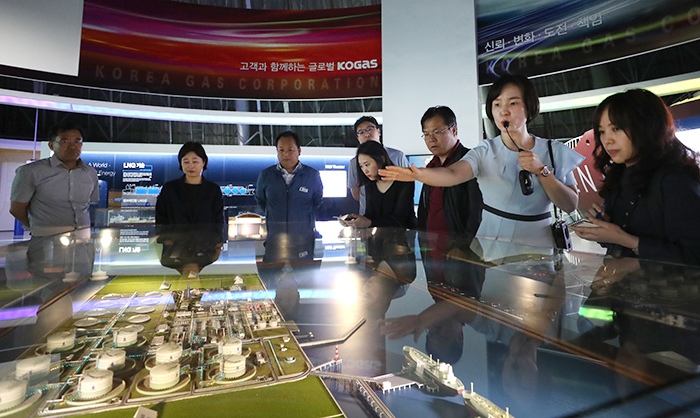
A Korea Gas Corporation (KGC) employee explains how LNG is transported to representatives from the Ministry of Trade, Industry and Energy, in front of a model of the KGC's new LNG terminal, at the KOGAS Incheon LNG Terminal on June 28. (Kim Sunjoo)
By Lee Yoonseo and Kim Young Shin
Interest in clean, renewable energy and related industries is growing across the Korean economy. President Moon Jae-in recently launched a drive to steer away from nuclear power and there's a likely possibility that Korea will be able to import natural gas from the Russian Far East thanks to easing tensions on the Korean Peninsula and the recent Korea-Russia summit.
Natural gas, the naturally occurring gas mixture buried underground, is collected by drilling rigs, just like petroleum, to be used for power generation and heating. Depending on the means of transportation, it's called either piped natural gas (PNG), carried through pipelines, or else liquefied natural gas (LNG), carried after being converted into a liquid.
Because PNG is carried to the spot of consumption through a pipeline, it's mostly used in Europe or Northern America, where ground transportation is available.
LNG is liquefied by dropping the temperature to minus 162 C and then carrying it by sea. After an LNG ship arrives with its liquefied gas on board, the Korea Gas Corporation converts the liquid back to a gas at its terminals and then supplies it to power plants and residences.
Even though LNG requires a huge cost for liquefying, transporting and vaporizing, it's impossible for Korea to receive PNG from its origin, as the pipelines would have to cross North Korea by land.
However, a mood of reconciliation has begun to be seen on the Korean Peninsula recently. If South Korea and North Korea successfully establish trilateral economic ties with Russia, importing PNG from Russia overland might become possible.
From Vladivostok in the Russian Far East, the gas could be carried across North Korea to major cities in South Korea. This could remove all the unnecessary conversion process and reduce costs for final consumers in Korea.
On June 22, President Moon and his Russian counterpart, Vladimir Putin, held a summit and agreed to conduct joint research into connecting Korea to a PNG pipeline. There's much attention being paid to the development of gas cooperation among South Korea, North Korea and Russia, as the economic impact of the easing of tensions on the Korean Peninsula would be plentiful.
clo1120@korea.kr
Most popular
- Korea.net welcomes 2025 K-influencers, Honorary Reporters
- 2025 Honorary Reporter class pledges to spread 'real Korea' worldwide
- Actor Bae Doona's first romcom in decade to hit theaters in May
- US urged to exempt tariffs on Korea in first '2+2' trade talks
- 'Gangnam Style,' 'Baby Shark' make YouTube's 2005-25 best list
